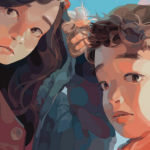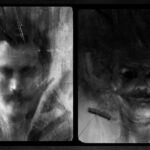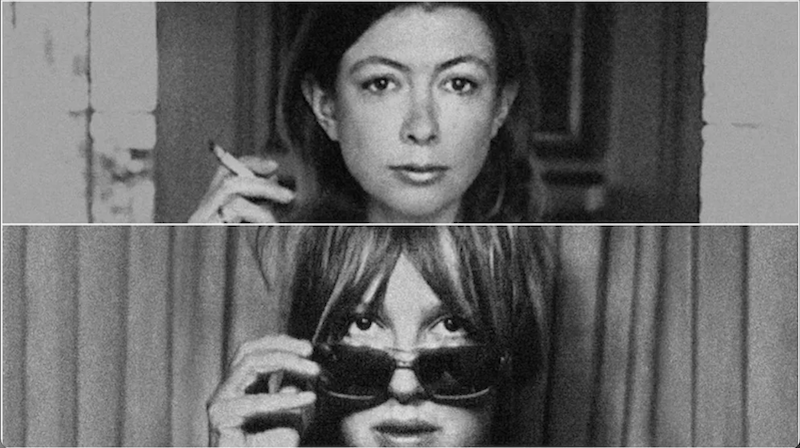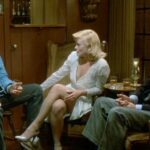Counsel woven into the fabric of real life is wisdom.
—Walter Benjamin
…men jive around with each other instead of dealing for real and later for all the beating-on-the-chest raw gorilla shit, all the unresolved stuff slops over into man/woman relationships.
—Toni Cade Bambara
I did for ten-year-old Malik what had been done for me many times over: I gave him a book.
Not just any book, but The Autobiography of Malcolm X, a book I had read three times and faithfully carried with me everywhere I went. Pardon the cliche, but it was my bible. It changed and saved my life and I was sure it would save Malik’s, too.
When we met, the first words he said to me were, “Yo, you wack.” It was my sophomore year of college and I’d been recruited to be a volunteer at an after school program not too far from campus. My mother always stressed the importance of “giving back.” I was trying. Malik felt I was doing so insufficiently.
But I was nineteen years old with no prior experience working with kids. When Malik told me I was wack, he wasn’t wrong. In the two weeks I had been volunteering, I’d barely spoken to any of the kids. The one girl I tried to help figure out multiplication quit on me. I wasn’t particularly good at any of the games we played and even worse at getting (and holding) the attention of these eight, nine, and ten year-olds beyond a minute.
Luckily, Malik telling me I was wack wasn’t a dismissal. It was an invitation. He was a smart, perceptive, charismatic kid. He knew I needed some help. He decided to show me the ropes.
We bonded over the same things that had helped me form relationships with every other black male in my life: sports and rap. He liked football over basketball, a point on which we differed, and Common over Lil’ Wayne, which was surprising and refreshing for my “conscious rap” loving ears to hear coming from a ten year-old.
We couldn’t just be homies, though, since the whole point of the program was to provide guidance with schoolwork. I was at turns a tutor, caretaker, and disciplinarian. I often had to sit Malik down for serious talks about grades and responsibility and his future. I wasn’t very good at this, but it was in those moments I got to know Malik better, where he opened up to me beyond sports and rap and jokes. Every day I worried about him more, cared for him with more of my heart, felt a desire to protect him from the world I knew he would encounter. And so I did what I had seen everyone else do when they cared about a black boy’s life: I gave him a book.
Passing down a book is passing down history; in history we believe we will find a sense of belonging. I was a given a number of books throughout my life with the understanding that I would begin to see myself in the work. I heard the (valid) complaints and criticisms about how the school system ignored the work of black men, leaving black boys disinterested in the literary offerings because they didn’t relate to the black male experience. We weren’t being exposed to black male authors, who could be more worthy role models than the rappers and ball players we idolized. We were being denied the opportunity to imagine ourselves outside of our station as second-class citizens. It was up to the beloved community to take up the slack.
My mother put Richard Wright’s Native Son and Black Boy in my hands; college professors pushed Ralph Ellison’s Invisible Man and James Baldwin’s The Fire Next Time on me; I had picked up The Autobiography of Malcolm X on my own, but not without everyone around me having already preached about its healing power. These were my black boy survival kit. They were part of the literary the canon for black boys trying to create ourselves in a world that had already defined us. I tried to get Malik started with his own.
I hope he found meaning in it the same way I did, but a decade later, I wish I’d given him Audre Lorde’s Sister Outsider instead. I wouldn’t have, because at nineteen I didn’t know it existed and Lorde’s name was but one of many I’d heard rattled off on the conscious brothers and sisters checklist. And this is no diss to Malcolm’s profound, vital, moving text—I still keep a copy on my nightstand—but a recognition of how incomplete our attempts at educating black boys tend to be.
The black boy literary survival kit is populated by books that summarize the black male experience of racism in America. These books teach us what lies ahead in a country where white supremacy over-determines our every move. What these books don’t ask us to do is interrogate our relationships to patriarchy and gender oppression, homophobia and heterosexism, and the toxic makeup of the modes of masculinity we have adopted for survival. With little variation to the narrative, what they allow for us black boys attempting to survive white supremacy is an excuse for centering our own oppression, to the point we refuse to recognize how it manifests in the lives of black women. Bigger Thomas rapes and kills Bessie, but we think it’s only because of the pressure of living in a white supremacist society.
In the introduction to her book, Race Men, Hazel V. Carby writes:
[T]he work of black women intellectuals is still considered peripheral by the black male establishment. It is true that, superficially, the situation appears to have improved. The words ‘women and gender’ are frequently added after the word ‘race’ and the appropriate commas, and increasingly the word ‘sexuality’ completes the litany. On occasion a particular black woman’s name will be mentioned, like that of Toni Morrison. But the intellectual work of black women and gay men is not thought to be of enough significance to be engaged with, argued with, agreed or disagreed with. Thus terms like women, gender, and sexuality have a decorative function only. The color the background of the canvas to create the appropriate illusion of inclusion and diversity, but they do not affect the shape or texture of the subject.
We teach black boys to revere W.E.B. Du Bois, and allow Anna Julia Cooper to remain a stranger to them. We want black boys to write like Ellison, Wright, and Baldwin (so long as it’s Baldwin’s consideration of racism, not that of sexuality), but not Hurston, Bambara, or Lorde.
The question isn’t whether black boys should be told to read The Fire Next Time or not (they should), but why we don’t also tell them to read Alice Walker’s In Search of Our Mothers’ Gardens. Of course, I know the answer to that—it’s because we hate black women. And yes, I know each of us loves our mother/sister/big mama/auntie/wife/girlfriend/daughter. We love black women as ornaments to our masculinity. We hate to engage the intellectual and emotional complexity of black women and the art they create because it reminds us that even as black boys and men trying not to be crushed by oppression, we are mighty fine crushers ourselves. We know the power of literature. It’s why we created this canon and pass it down to our boys, to give them the tools to combat the self-hatred imposed upon them by a system committed to breaking them. We avoid giving them the literature that similarly examines the interior of black women’s lives in order that they may retain the myth of their innocence.
How different would our conversations about Bill Cosby, R. Kelly, Chris Brown, and now Nate Parker be if every black man came to it having already read Pearl Cleage’s “Mad at Miles”?
If our survival kit included black women’s voices, our survival tactics would include them, too. If our canon were expanded, we would no longer be allowed to mimic the masculinist narratives of our past and feel proud of our stagnation.
One of the newest entrants in the black boy literary canon, Ta-Nehisi Coates’s blockbuster Between the World and Me, received its share of criticism for failing to incorporate the experiences of black women into its narrative around the evils of white supremacy. “It’s a shame that the inclusion of black women in this work doesn’t seem to have progressed much further than Baldwin’s time,” Shani O. Hilton wrote for Buzzfeed; “Black women hover on the margins of the story, at times shoved there… Coates describes black women lovingly, almost ethereally, but they rarely appear as complicated, fully fleshed-out people,” Brit Bennett wrote for The New Yorker; “[I] would be remiss not to mention the absence of women as full agents in their own lives; instead the women serve as witnesses to the trauma of black men. They are mothers—edifying, saintly, loving—but not subjects,” Hope Wabuke wrote for The Root; “Coates’ description of violence to the Black body does not do justice to the violence to which Black women are and have historically been subject. That violence looks different. It feels different,” Josie Duffy Rice wrote for Rewire.
And yet Coates does briefly mention this violence, when he writes to his then fourteen year-old son: “I am not a cynic. I love you, and I love the world, and I love it more with every new inch I discover. But you are a black boy, and you must be responsible for your body in a way that other boys cannot know. Indeed you must be responsible for the worst actions of other black bodies, which, somehow, will always be assigned to you. And you must be responsible for the bodies of the powerful—the policeman who cracks you with a nightstick will quickly find his excuse in your furtive movements. And this is not reducible to you–the women around you must be responsible for their bodies in a way that you never will know.”
There are a few different ways of reading this last sentence. In one way it’s a concession–a brief recognition that there are things that happen to women’s bodies that the author will never fear but knows he must acknowledge–in yet another a dismissal—that this experience is so unknowable it’s not worth trying–but seems to be meant as something different—a genuine act of solidarity with the violence visited upon women’s bodies. In any event it ends there; there is no further examination of that violence, nor the place of the author or his son within the system that relies on that violence to exist.
What if it did? It would have been a different book. It would not have been the book Coates set out to write. And perhaps, it should not be judged on any other basis than what he himself set out to accomplish. But the criticism he received reflects a yearning for something. We need different books. We need different wisdoms.
I spent all of last year writing my first book, and large chunks of that time were spent ravaged by professional jealousy as I watched the country respond to Coates’s book. I wouldn’t dare speak for us all, but I imagine most black writers working on books at that time felt at least a twinge of the same. It started to feel as though there was going to be, for the book buying and reading public, Ta-Nehisi and then everything else, that there would be no oxygen left for the multitude of voices emerging to respond to the current generation of racist violence and movement politics.
But jealousy aside, once I read the book and the critiques, I knew I was wrong. There was going to space because there was going to be a need for something new. And no one person was going to be able to provide that new thing. But I could be a part of it.
I wanted to challenge the canon. I claim no self-righteous perfection. The end result of my struggle, Invisible Man, Got the Whole World Watching, is a text beset by privileges—cisgender, hetero, the relative luxury of being able to write for a living—that are not always adequately challenged within. And I don’t wish to pretend to be the first black male writer to sweep out the corners of black masculinity and interrogate the dust. I stand where Mark Anthony Neal, Kiese Laymon, Greg Tate, Essex Hemphill, Haki Madhubuti, and others have stood before me. But we stand on the margins, nudging the canon to change, to ask more of itself, to not be complacent.
Now, people send me pictures of the same black boys I imagined while I was writing, holding and reading my book. I can’t help but smile at every one. And then I think about Malik. I think back on the five months we spent together and how often I failed him. I think of the role I played in normalizing macho posturing and sexist jokes in the life of a ten-year old who was looking to me for guidance. I think of how ashamed I am of how proud I was.
My book, in a way, is an apology to him. If I could go back to that moment before we parted ways, where I held him in my arms as he cried because he would miss me, and I cried because I didn’t think I was worth missing, I would have said, “You were right. I am wack. I tried to save you when I didn’t know what you needed to be saved from. I’m wack for falling into the same bullshit ideas about black masculinity that had been handed down to me, and letting you think it was OK for you to follow me there. I’m sorry. I’m wack and you need black women more than you know. I’m gonna go try not to be wack. I hope my wackness didn’t hurt you.”
I hope someone helped him figure that out.




















